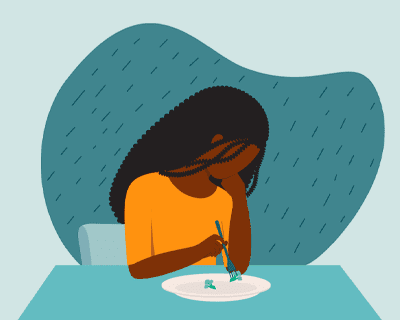Anorexia nervosa is a mental health disorder that is characterized by extreme fear of gaining weight, as well as a distorted body image. People with anorexia often see themselves as overweight, even when they are dangerously underweight. As a result, they will severely limit their food intake to lose weight or exercise excessively.
Types of Anorexia
There are two subtypes of anorexia nervosa: restricting and binging/purging. People with restricting subtypes of anorexia nervosa restrict their food intake by severely limiting their calorie intake and/or exercising excessively.

People with binge-eating/purging subtypes of anorexia nervosa also restrict their food intake, but they also purge the food they eat by vomiting or using laxatives. Both subtypes of anorexia nervosa are severe and can lead to life-threatening consequences.
Avoidant Restrictive Food Intake Disorder (ARFID) is an eating disorder similar to anorexia nervosa. ARFID is characterized by a fear of food and a lack of interest in food. People with ARFID often avoid certain foods or textures due to these fears. As a result, they can become malnourished.
In addition, Atypical anorexia nervosa refers to certain cases of anorexia nervosa that do not follow the established pattern. These cases may meet all the other criteria, without the presence of low body weight.
Causes of Anorexia
The exact cause of anorexia nervosa is unknown. However, experts believe that this mental health is likely due to a combination of genetics and environment. For example, people with a family history of eating disorders or mental illness may be more likely to develop anorexia nervosa. Additionally, people who live in cultures that place a high value on thinness or appearance may be more likely to develop anorexia nervosa.
Several factors can increase a person’s risk of developing anorexia nervosa, including:
- A history of dieting
- A personality trait that leans towards obsessiveness or perfectionism
- A history of anxiety or depression
- Trauma or abuse
- Family members with mental disorders or eating disorders
- The pressure of conforming to societal norms that don’t reflect their values

For more on the origins of eating disorders, read what EHN Canada Psychiatrist Dr. Kalam Sutandar had to say here.
Anorexia Risks and Complications
Several medical complications may arise in those with anorexia nervosa, including:
- Kidney Problems
- Liver Damage
- Osteoporosis
- Anemia
- Infertility
- Brain Damage
- Damage To the Digestive System
- Lower Blood Pressure
- Irregular Heartbeat
- Hair Loss
Symptoms of Anorexia
You cannot simply tell if someone has anorexia by looking at them. The cognitive and behavioural symptoms are often more apparent. Here are some of the most common symptoms:
- Preoccupation with food, weight, and dieting
- Refusal to eat or eating very little
- Excessive exercise
- Skipping meals
- Eating only certain foods
- Cooking for others but not eating
- Hiding food
- Eating in secret
- Weight loss
- Fatigue
- Insomnia
- Irritability
Recovery is possible.
If you think someone you know has anorexia, there are things you can do to help.
First, try to have an open and honest conversation with the person. Avoid judgmental language or criticism. Instead, express your concern in a loving and supportive way.
You can also offer to go with the person to their doctor’s appointments or therapy sessions. This show of support can be helpful for someone struggling with anorexia.
Finally, try to be patient. Recovery from anorexia can take time. Offer your support and encouragement throughout the process.
If you or someone you know is struggling with anorexia, getting professional help is the best action. Anorexia is a severe mental illness with potentially life-threatening consequences. If you’re worried about someone, don’t hesitate to get professional help.
Seek Professional Help
A major obstacle to treating anorexia is that people may not want help or may not think they need it. EHN Canada is here to help.
EHN Canada’s Approach to Anorexia and Other Eating Disorders
Every eating disorder journey is unique. We offer multiple treatment streams for anorexia, bulimia, and binge eating and tailor your recovery with evidence-based plans that fit your needs.
All streams involve group and one-on-one therapy, meal supervision, nutritional rehabilitation, and physical health and wellness activities for holistic healing. The clinical team includes psychiatrists, psychotherapists, registered dieticians, nutritionists, and other medical experts who specialize in treating eating disorders.
When you come to Bellwood, EHN Canada’s centre for Eating Disorders treatment, you learn the skills and build the habits you need to repair your relationship with your body image and food.
How To Succeed in Eating Disorder Treatment
We’re dedicated to your recovery, both during and after treatment.
Successful recovery begins in treatment. We continually assess your progress and adjust our approach to fit your changing needs. Our treatment streams are entirely customizable.
After treatment, Ontario residents are invited to join our Aftercare program, which gives you access to ongoing support.
Are you or someone you know struggling with anorexia?
Please call our helpline at 1-866-963-6343 or fill out our online form to get started. We offer free, confidential screenings and can help connect you with the treatment you need.




